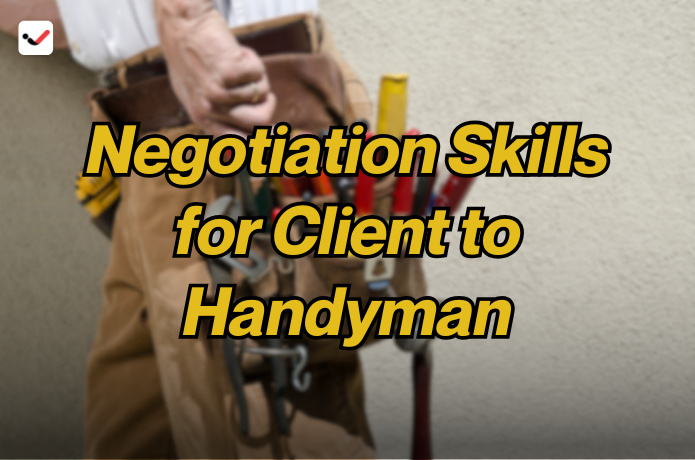Negotiation Skills for client to Handyman
Negotiation Skills for client to Handyman

man for home repairs or maintenance tasks, effective negotiation skills can save you both time and money. Many homeowners feel unsure about how to approach these conversations, but clear communication and understanding can lead to better outcomes. Whether you need a quick fix or a long-term project, knowing how to negotiate ensures you get quality work at a fair price.
The process of negotiating with a handyman doesn’t have to be complicated or stressful. With a few essential strategies, you can establish trust, clarify expectations, and secure an agreement that works for both parties. This guide offers practical advice to help you communicate confidently and achieve the results you need.
Understand Your Needs
Before approaching a handyman, take time to understand the scope of your project. Make a list of tasks that need attention, and prioritize them based on urgency. Being clear about what you want helps you communicate effectively and avoids misunderstandings. For instance, knowing whether you need a repair, installation, or regular maintenance allows the handyman to provide an accurate estimate.
Research common costs for the services you need. This gives you a baseline to determine whether a quoted price is reasonable. Local rates can vary, so comparing quotes from a few handymen in your area will help you feel more confident about pricing.
Choose the Right Handyman
Finding the right handyman is crucial. Ask for recommendations from friends or family and check online reviews to gauge reliability. Look for professionals with strong communication skills and experience in the type of work you need. Once you’ve narrowed down your options, request a portfolio of their past projects or references to verify their expertise.
Certifications or licenses, while not always mandatory, can indicate professionalism. Ensure the handyman is insured to protect yourself from liability in case of accidents during the job. When you find a suitable candidate, prepare for the negotiation by clearly outlining your expectations and budget.
Build Trust and Rapport
A positive working relationship starts with mutual respect. Begin your negotiation with a friendly approach, showing appreciation for the handyman’s skills and experience. Small gestures like introducing yourself warmly and asking about their background can go a long way in building trust.
During discussions, remain honest about your budget constraints and expectations. Transparency fosters cooperation and reduces the likelihood of disputes. Handymen often appreciate clients who value their expertise and communicate openly about their needs.
Discuss Pricing and Payment Terms
When discussing costs, be direct and ask for a detailed breakdown. This ensures you understand what you’re paying for and prevents hidden fees later. For example, inquire whether the quote includes materials, labor, and any additional costs. Handymen who provide clear, itemized estimates are more likely to be trustworthy.
If the initial price seems high, don’t hesitate to negotiate. Politely ask if there’s room for adjustment or if they can recommend cost-saving alternatives. For instance, purchasing materials yourself or bundling multiple tasks may reduce the overall expense. Once you agree on a price, confirm payment terms, including deposits, milestones, and final payments.
Clarify Expectations
Clear communication is key to avoiding misunderstandings. Outline all aspects of the project, including timelines, materials, and desired outcomes. Providing photos or diagrams can help convey your vision. Ask the handyman to confirm their understanding and offer suggestions if needed.
Establish a timeline that works for both parties. Handymen often have multiple clients, so agreeing on realistic deadlines ensures your project stays on track without unnecessary pressure. Put all agreements in writing to create a reference for both parties.
Remain Flexible and Solution-Oriented
While it’s important to advocate for your preferences, flexibility can make negotiations smoother. Handymen often face unforeseen challenges, such as supply shortages or weather delays. Being understanding in such situations fosters goodwill and encourages them to prioritize your project.
If disagreements arise, approach them with a solution-oriented mindset. For example, if a particular material is unavailable, discuss alternative options rather than insisting on delays. Compromises show that you value the handyman’s input and are willing to collaborate.
Leverage Long-Term Benefits
Building a strong relationship with a handyman can be advantageous for future projects. Clients who are respectful and fair during negotiations are more likely to receive priority service and better deals in the long run. If you’re satisfied with the work, express your appreciation and consider recommending their services to others.
Offering positive reviews online or providing referrals is another way to strengthen your relationship. Handymen often rely on word-of-mouth for new clients, so your endorsement could lead to mutual benefits.
Conclusion
Negotiating with a handyman is a skill that can lead to better quality service, fair pricing, and a positive working relationship. By understanding your needs, choosing the right professional, and communicating clearly, you can secure the best outcome for your project. Building trust, discussing terms transparently, and remaining flexible are key to successful negotiations.
With these strategies, you’ll not only ensure that your home improvement tasks are handled effectively but also create a partnership that you can rely on for years to come. Whether it’s a small repair or a large-scale renovation, strong negotiation skills empower you to achieve the results you desire.

